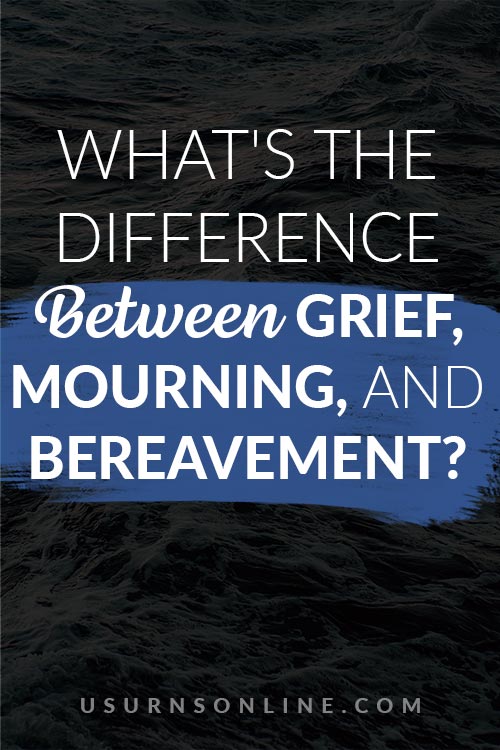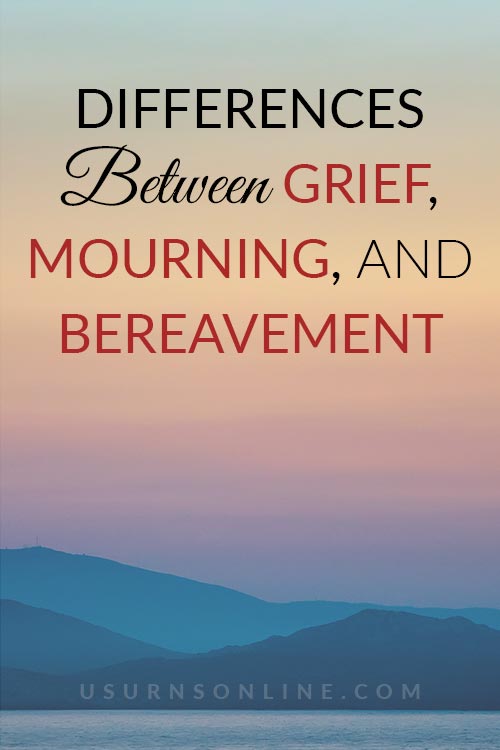Grief, mourning, and bereavement are different from each other? The answer is yes, they are different.
Don’t feel bad if you didn’t realize that, because you are not the only one. A lot of people use the words interchangeably.
Our website is supported by our users. We sometimes earn a commission when you click through the affiliate links on our website. See our privacy policy & disclosures for more information.
Grief, Mourning, and Bereavement
Take a few minutes to read on and learn the meaning for grief, mourning, and bereavement. Then we’ll discuss how they are different.
What is Grief?
Grief is the internal experience of emotions after any loss.
Grief is the standard response when acting towards a loss. Experiencing death will bring on the feeling of grief. Feeling grief at the loss of a marriage or job is also expected.
Undergoing any loss can trigger the grieving process.
What is Mourning?
Mourning is the outward expression of grief.
Being “in mourning” is to follow the social norms set by society and culture.
- Wearing black
- No (or minimal) social life for twelve months
- Public displays of mourning. Day of the Dead in Mexico or hiring professional mourners are just two examples of public displays of mourning.
- Funerals
- Memorials and tributes
- Journaling
What is Bereavement?
Bereavement is the period of time immediately following a loss, during which you experience grief and express mourning.
Urns Made in the USA
Bereavement is the state of being sad because a family member or friend has recently died. Feeling bereavement after any loss is perfectly normal.
This might include:
- Divorce
- Moving away from home
- Loss of a job
- End of a friendship
- Death of a friend, loved one, family member, or pet
The Difference Between Grief and Mourning
Grief is what you think and feel on the inside. You can grieve and keep that emotion hidden from the world.
Mourning is what you show to the world. It is an outward expression of your grief. Crying, wailing, and wearing black clothing are all expressions of mourning.
And bereavement is the period of time during which you feel grief and express mourning. Some cultures have set lengths of time, while others are more open-ended.
For most who have experienced the loss of a loved one, you will experience some level of grief and mourning the rest of your life, even as you learn to cope with the loss.
Learning to Cope with Grief
There are healthy ways to grieve and cope with your loss. You may experience all kinds of difficult and unexpected emotions—the feelings of shock or anger, disbelief, guilt, and intense sadness. Your feelings are valid and should be acknowledged.
Most people associate grief with a loved one’s death, but any loss can cause you to feel grief. Don’t let anyone diminish your suffering. The grieving process is a personal journey, and it takes time. Don’t be too hard on yourself.
Grief comes and goes in stages. In 1969, Elisabeth Kübler-Ross described five common stages of grief, popularly referred to as DABDA.
- Denial – It’s normal to think, “This isn’t happening.”
- Anger – You may feel frustrated and helpless. These feelings later turn into anger.
- Bargaining – You may think “If only…” and “What if…”
- Depression – A deep overwhelming sadness may set in once you begin to understand the loss and its effect on your life.
- Acceptance – You accept the reality of your loss. You know it can’t be changed. Although you still feel sad, you’re able to start moving forward with your life.
Don’t be discouraged if you go through a stage and end up repeating it. That is common and is not a failure. Everyone grieves differently and at their own pace; it doesn’t last “X amount” of months. It lasts as long as it lasts.
How to Express Grief Through Mourning
Mourning is the expression of grief. How do you let that grief out?
- Crying – Crying is not a sign of weakness. It’s a release.
- Adapting – You will have to adjust to living differently after your loss.
- Journaling – Keep a journal of day-to-day activities and feelings.
- Seek company – Try not to isolate yourself. Share some downtime with friends or family.
- Find a grief counselor – find a certified grief counselor to help you deal with your feelings.
- Take up new activities – try yoga, a book club, or anything new. It’s a great way to meet new people or solidify older relationships.
10 Myths About Grief and Grieving
1. Myth: If you don’t cry, it means you aren’t sad about your loss.
Fact: Remember, crying is a normal response to sadness, but it’s not the only response. You might not cry, but you may feel the pain just as intensely as others. You may have other ways of expressing your grief.
2. Myth: Grieving should last a year.
Fact: Grief is so personal. Everyone grieves at a different pace. You may never get over your grief and the loss you have experienced. It doesn’t mean you won’t feel better. Life will be different. You will feel happiness again.
3. Myth: The pain will go away faster if you ignore it.
Fact: It is necessary to face your grief and deal with it. Ignoring your pain or trying to keep it from surfacing will only make it worse. Your feelings will end up presenting themselves negatively if not faced head-on.
4. Myth: It’s essential to stay strong.
Fact: Feeling gloomy, fearful, or lonely is a normal reaction to the loss you have experienced. You don’t need to “protect” anyone by trying to be brave. Showing your true feelings is part of healing.
5. Myth: Women grieve more than men.
Fact: Both men and women experience grief. Men and women go through a similar process. Women might, at times, be more demonstrative in their distress, but it doesn’t mean that men don’t grieve just as deeply.
6. Myth: The first year is the hardest.
Fact: We like to know what to expect; it’s part of human nature. But all too often, the words “the first year is the hardest” are said to comfort or bring hope as if the time period following the “hard” part will be easier. Grief is hard. Period.
7. Myth: Grief has an endpoint.
Fact: Grief doesn’t just disappear. You may wish it to go away, but it’s not possible. You have to work through your grief, and it will take time.
8. Myth: The end goal of grief is to find closure.
Fact: The goal of grief needs to be determined by you. Your goal might be to journey through the feelings of sadness, anger, loss, and guilt while moving forward.
9. Myth: People struggling with grief just need to “get over it.”
Fact: You can’t just move on from grief, and sometimes you may need some professional help. “Get over it” should never be said to a grieving person.
The author of the book Grief Works, Julia Samuel, explains, “You never ‘get over it,’ you ‘get on with it.’ And you never ‘move on,’ but you ‘move forward.”
10. Myth: You recover from grief like you recover from a cold.
Fact: Grief does not get a little better every day until it completely goes away. Grief will never completely go away, and you shouldn’t expect it to.
I hope that you have found some help or solace by reading this article. If you need help to cope with your grief, don’t hesitate to reach out to someone.
“It’s so curious; One can resist tears and ‘behave’ very well in the hardest hours of grief. But then someone makes you a friendly sign behind a window, or one notices that a flower that was in bud only yesterday has suddenly blossomed, or a letter slips from a drawer… and everything collapses.”
~ Colette (French novelist and actress Sidonie-Gabrielle Colette)
Read Next: What is Prolonged Grief?
Pin It





